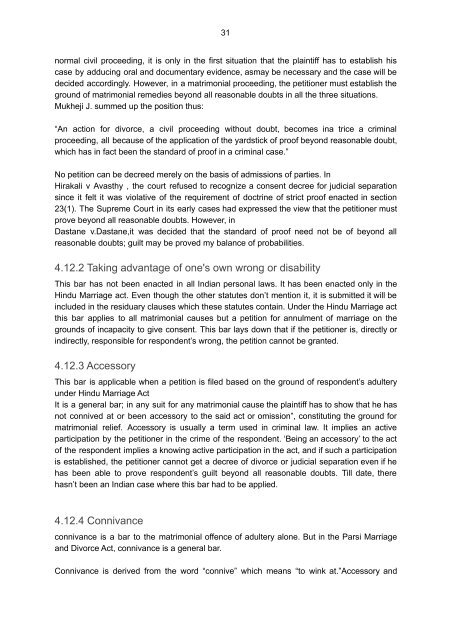F I - Google Docs
Create successful ePaper yourself
Turn your PDF publications into a flip-book with our unique Google optimized e-Paper software.
31<br />
normal civil proceeding, it is only in the first situation that the plaintiff has to establish his<br />
case by adducing oral and documentary evidence, asmay be necessary and the case will be<br />
decided accordingly. However, in a matrimonial proceeding, the petitioner must establish the<br />
ground of matrimonial remedies beyond all reasonable doubts in all the three situations.<br />
Mukheji J. summed up the position thus:<br />
“An action for divorce, a civil proceeding without doubt, becomes ina trice a criminal<br />
proceeding, all because of the application of the yardstick of proof beyond reasonable doubt,<br />
which has in fact been the standard of proof in a criminal case.”<br />
No petition can be decreed merely on the basis of admissions of parties. In<br />
Hirakali v Avasthy , the court refused to recognize a consent decree for judicial separation<br />
since it felt it was violative of the requirement of doctrine of strict proof enacted in section<br />
23(1). The Supreme Court in its early cases had expressed the view that the petitioner must<br />
prove beyond all reasonable doubts. However, in<br />
Dastane v.Dastane,it was decided that the standard of proof need not be of beyond all<br />
reasonable doubts; guilt may be proved my balance of probabilities.<br />
4.12.2 Taking advantage of one's own wrong or disability<br />
This bar has not been enacted in all Indian personal laws. It has been enacted only in the<br />
Hindu Marriage act. Even though the other statutes don’t mention it, it is submitted it will be<br />
included in the residuary clauses which these statutes contain. Under the Hindu Marriage act<br />
this bar applies to all matrimonial causes but a petition for annulment of marriage on the<br />
grounds of incapacity to give consent. This bar lays down that if the petitioner is, directly or<br />
indirectly, responsible for respondent’s wrong, the petition cannot be granted.<br />
4.12.3 Accessory<br />
This bar is applicable when a petition is filed based on the ground of respondent’s adultery<br />
under Hindu Marriage Act<br />
It is a general bar; in any suit for any matrimonial cause the plaintiff has to show that he has<br />
not connived at or been accessory to the said act or omission”, constituting the ground for<br />
matrimonial relief. Accessory is usually a term used in criminal law. It implies an active<br />
participation by the petitioner in the crime of the respondent. ‘Being an accessory’ to the act<br />
of the respondent implies a knowing active participation in the act, and if such a participation<br />
is established, the petitioner cannot get a decree of divorce or judicial separation even if he<br />
has been able to prove respondent’s guilt beyond all reasonable doubts. Till date, there<br />
hasn’t been an Indian case where this bar had to be applied.<br />
4.12.4 Connivance<br />
connivance is a bar to the matrimonial offence of adultery alone. But in the Parsi Marriage<br />
and Divorce Act, connivance is a general bar.<br />
Connivance is derived from the word “connive” which means “to wink at.”Accessory and


